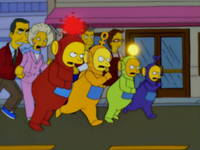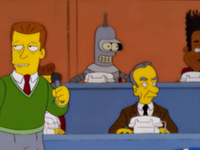- Missionary: Impossible
-
"Missionary: Impossible" is the fifteenth episode of the 11th season of The Simpsons, which originally aired February 20, 2000.
Contents
Plot
In an attempt to end a pledge drive which interrupts a favorite show of his on PBS (a Thames Television British sitcom entitled Do Shut Up), Homer pledges $10,000 to the network. Homer is applauded for saving the network, but it quickly becomes apparent that he does not have the money, prompting pledge drive host Betty White and a mob of characters and personalities from various PBS shows (including the Teletubbies, Oscar the Grouch, Yo-Yo Ma, Elmo, Fred Rogers and Big Bird) to chase him through the streets. Fortunately, Reverend Lovejoy saves Homer after he runs into the church. Reverend Lovejoy gets Homer past the mob by hiding him in a bag disguised as a sack of children's letters to God. Lovejoy puts Homer on a cargo plane to the South Pacific, where he will become a missionary in "Microasia," despite Homer's lack of religious faith (to the point he mistakenly calls Jesus "Jeebus").
Homer calls back to Marge in Springfield with a radio, during which he promotes Bart to "the man of the house", Lisa to "boy", Maggie to the "brainy girl" and the toaster to "Maggie", making Marge a consultant. Bart replaces Homer at the Springfield Nuclear Power Plant, where Mr. Burns criticizes Homer's record and, not recognizing whom he is talking to, pokes Bart with a stick. After coming home from a hard day at work, Bart agrees to take Marge out for dinner one night.
Homer arrives on the island and he meets Qtoktok and Ak. He also meets a native girl who acts and sounds (and is voiced by the same voice actor) exactly like Lisa that he names "Lisa Jr." At first, he is so desperate that he drops to the ground writhing and crying "Oh God!" repeatedly (which the natives all imitate, following his example). The natives are first portrayed as noble savages, ignorant of and unspoiled by North American civilization. Homer eventually begins trying to teach them about religion, but realizing that he knows nothing about it, he tries something new and decides to build a casino on the island, which he names "The Lucky Savage". This introduces alcohol, gambling, and violence to the island, and ruins the natives' virtuous way of life.
After the failure of the casino, Homer builds a chapel in penance, but he and Lisa Jr. ring the bell too loudly, causing an earthquake that releases a river of lava. The chapel, carrying Homer and Lisa Jr., starts to sink into the lava. As the two are about to meet their deaths, the scene cuts to another pledge drive, this time for the Fox network. It is revealed that Homer's adventures and mishaps were all recorded while he was on the island, but the show is in danger of cancellation, as is the entire network (cf. the 1989 film UHF). Various Fox show personalities are manning the phones, joined by a cranky Rupert Murdoch and hosted again by Betty White, who entreats the viewers to help keep "crude, low-brow programming", such as Family Guy, on air. Bart calls in and pledges a $10,000 donation. Murdoch remarks that Bart Simpson has saved his network, to which Bart replies "Wouldn't be the first time".
Cultural references
In the beginning of the episode Homer is watching a program called Do Shut Up, described as "a delicious British sitcom about a hard-drinking yet loving family of soccer hooligans".[1] The program seems similar in style to early nineties BBC show Bottom. British English expressions terms used in the sitcom include "noggin" and "soddin".[1] The song playing when the program starts is "No Feelings" by the Sex Pistols. When Homer defaults on his financial pledge of support to PBS, references seen to characters from other programs that pursue him through the town include Yo-Yo Ma, Big Bird, the Teletubbies, and Garrison Keillor.[1] In addition, there is a scene where Homer is licking toads, and he sees the toad reciting the lyrics to "Comfortably Numb" by Pink Floyd in Marge's voice. The theme that Homer's attempts at giving the islanders what he considers "civilization" leads only to the demise of their peaceful innocence parallels the theories of 18th century philosopher Jean-Jacques Rousseau.
Censorship
When Homer is watching Do Shut Up, he says about the main characters "If they're not having a go at a bird, they're having a row with a wanker!" On Sky One, the last word in this line is redubbed with "bird", since the word "wanker" is considered obscene in the United Kingdom and is often censored in programs airing before the watershed.[2] This is the second Simpsons episode using the word "wanker", after season nine's "Trash of the Titans". Both utterances of the word were censored in the United Kingdom.
Reception
Jeff Cotton of The Observer characterizes the episode as "A Classic".[1] Cotton notes: "There's a big finish, and one of those jokes at Fox's expense you know they wouldn't allow if The Simpsons wasn't their biggest cash cow."[1] In a review of the episode for The Gazette, Alex Strachan writes: "Missionary: Impossible ... may not be the funniest Simpsons episode ever made. But it has some of the funniest lines about TV."[3] Strachan quotes Homer's description of the television program Do Shut Up to Bart: "If they're not having a go with a bird, they're having a row with a wanker," as one of the funniest moments in the episode.[3] Writing in his review of the episode for The Simpsons 11th season DVD release, Colin Jacobson of DVD Movie Guide is critical of an "inane" choice by the producers to have Homer refer to Jesus as "Jeebus".[4] However Jacobson gives the episode a positive review overall: "Highlighted by a fun turn from Betty White, the PBS segment amuses, and the pieces with Homer on the island do nicely as well. Despite 'Jeebus', this becomes arguably Season 11’s best episode."[4]
"Missionary: Impossible" was also named the best episode of the eleventh season of The Simpsons by IGN writers Robert Canning, Eric Goldman, Dan Iverson, and Brian Zoromski. They highlighted scenes "such as the building of the 'Lucky Savage' casino and the destruction of Homer's chapel by an earthquake and a river of lava," but also noted that "Some of the episode's best humor is back in Springfield, after Homer makes Bart the man of the house — as Bart fills in for Homer at the nuclear plant, Mr. Burns berates "Homer" for his poor performance record, gets tired of talking and ends up just poking Bart with a stick. Betty White also gives a great guest performance as herself, hosting a PBS telethon and ridiculing those viewers who watch but don't send in contributions."[5]
The episode has become study material for sociology courses at University of California Berkeley, where it is used to "examine issues of the production and reception of cultural objects, in this case, a satirical cartoon show", and to figure out what it is "trying to tell audiences about aspects primarily of American society, and, to a lesser extent, about other societies."[6] Some questions asked in the courses include: "What aspects of American society are being addressed in the episode? What aspects of them are used to make the points? How is the satire conveyed: through language? Drawing? Music? Is the behavior of each character consistent with his/her character as developed over the years? Can we identify elements of the historical/political context that the writers are satirizing? What is the difference between satire and parody?"[6]
The New York Times "The Lede", mentions how Homer is a "good Catholic" according to an article in L’Osservatore Romano and offers a clip from this episode in which Homer "memorably" declared, “I’m no missionary, I don’t even believe in Jebus!” seconds before uttering the despairing plea, “Save me, Jebus!”[7]
References
- ^ a b c d e Cotton, Jeff (May 1, 2005). "OTV: 6 May: Pick of the day: Jebus Loves Ya: The Simpsons: Missionary Impossible Channel 4". The Observer (Guardian Newspapers Limited): p. 89.
- ^ "Delete expletives?" (PDF). Advertising Standards Authority. Archived from the original on December 2, 2006. http://web.archive.org/web/20061202060305/http://www.asa.org.uk/NR/rdonlyres/1EAEACA7-8322-4C86-AAC2-4261551F57FE/0/ASA_Delete_Expletives_Dec_2000.pdf. Retrieved January 6, 2007. (pdf)
- ^ a b Strachan, Alex; CanWest News Service (June 17, 2004). "Classic Simpsons and SCTV: Strong night on comedy network. And voting begins anew on Canadian Idol with first two of 10 finalists revealed". The Gazette (CanWest Interactive): p. D4.
- ^ a b Jacobson, Colin (November 19, 2008). "The Simpsons: The Complete 11th Season (1999)". DVD Movie Guide (www.dvdmg.com). http://www.dvdmg.com/simpsonsseasoneleven.shtml. Retrieved 2011-01-10.
- ^ Canning, Robert (2010-01-08). "The Simpsons: 20 Seasons, 20 Episodes". IGN. http://tv.ign.com/articles/731/731095p2.html. Retrieved 2011-11-04.
- ^ a b Thomas B. Gold (2008). "The Simpsons Global Mirror". University of California Berkeley. Archived from the original on 2009-04-07. http://web.archive.org/web/20090407081710/http://sociology.berkeley.edu/documents/undergrads/syllabi/Soc190_1.pdf. Retrieved 2011-07-18.
- ^ Doubting Homer Proclaimed a Catholic by Vatican Newspaper The New York Times October 19, 2010 by Robert Mackey
Further reading
- Mackey, Margaret (June 26, 2008). "Extreme Literacies and Contemporary Readers". English in Education (NATE) 36 (2): 31–39. doi:10.1111/j.1754-8845.2002.tb00759.x.
- Cappelle, Bert (2006). "Negation in the margin of grammar". La négation: Formes, figures, conceptualisation / Negation: Form, Figure of Speech, Conceptualisation. Actes du colloque de littérature et de linguistique des 8 et 9 octobre 2004 (Presses Universitaires François Rabelais): pp. 403–425. Stéphanie Bonnefille and Sébastien Salbayre (eds.). https://www.kuleuven-kortrijk.be/nl/Onderzoek/Letteren/OnderzoekTaalkunde/FEST/DescriptiveEnglishGrammar/bert-cappelle/negation-in-the-margin-of-grammar_corrected-version.pdf. Retrieved 2008-12-23.
External links
- "Missionary: Impossible" at The Simpsons.com
- "Missionary: Impossible" episode capsule at The Simpsons Archive
- "Missionary: Impossible" at the Internet Movie Database
- Missionary: Impossible at AllRovi
- "Missionary: Impossible" at TV.com
Religion in The Simpsons Simpsons portal · Religion portal Religious
episodes"Homer vs. Lisa and the 8th Commandment" · "Homer the Heretic" · "Bart Sells His Soul" · "In Marge We Trust" · "Lisa the Skeptic" · "Simpsons Bible Stories" · "Faith Off" · "Missionary: Impossible" · "Pray Anything" · "Homer and Ned's Hail Mary Pass" · "Thank God, It's Doomsday" · "The Father, the Son, and the Holy Guest Star" · "Simpsons Christmas Stories" · "The Monkey Suit" · "Gone Maggie Gone""The Joy of Sect" · "Rednecks and Broomsticks"Religious
charactersThe Simpsons · Episodes · Media · Politics · Fictional religions Categories:- The Simpsons (season 11) episodes
- 2000 television episodes
Wikimedia Foundation. 2010.


